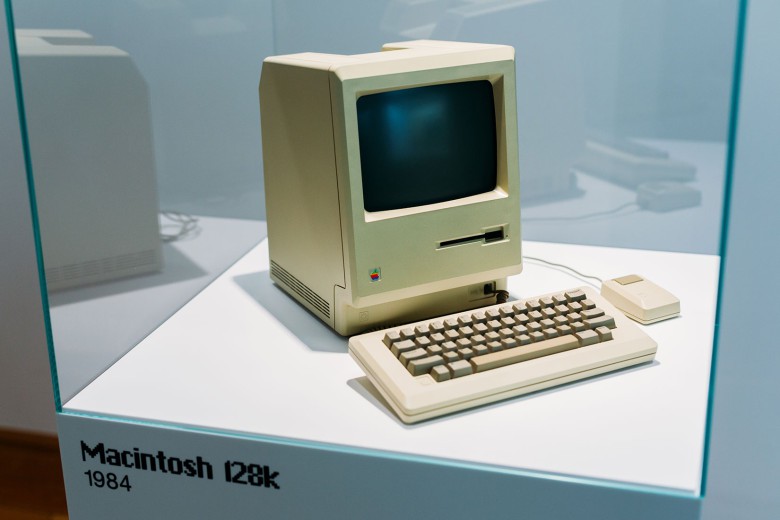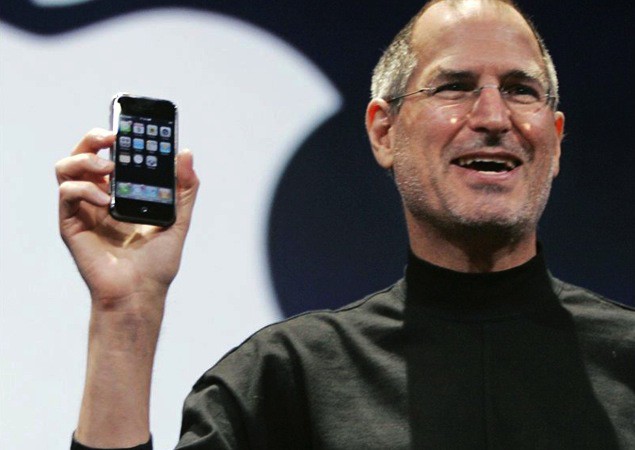Now that all the excitement we had for WWDC has died down, it’s probably time we took a break from iOS 10, macOS Sierra, and all the other things you haven’t been able to avoid over the past couple of weeks. So for this week’s Friday Night Fight, we’re looking at Apple’s history.
We’re focusing on which product has been Apple’s most important throughout the years. Was it the Macintosh that changed personal computing? The iPod that put thousands of songs in your pocket? The iPhone that revolutionized mobile devices?
Join us as we battle it out over Apple’s best ever releases — and which one was most significant!
 Luke Dormehl: How are you doing this Friday, Killian? With the post-WWDC lull kicking in, and plenty of real world Brexit-related uncertainty in our home country of the U.K., it’s nice to do a Friday Night Fight with a bit more of an historical spin, rather than focusing on current events. In terms of my own pick for Apple’s most important innovation, there’s no question about it: the Macintosh.
Luke Dormehl: How are you doing this Friday, Killian? With the post-WWDC lull kicking in, and plenty of real world Brexit-related uncertainty in our home country of the U.K., it’s nice to do a Friday Night Fight with a bit more of an historical spin, rather than focusing on current events. In terms of my own pick for Apple’s most important innovation, there’s no question about it: the Macintosh.
Now, on a purely financial level, the Mac doesn’t win this argument. It was a financial failure upon its launch in 1984, was supported by sales of the Apple II for the first several years of its life, and is today dwarfed by sales of the iPhone. There’s only really been one point in Apple’s history, in fact, when the Mac was unequivocally the company’s biggest product — and that was when Steve Jobs returned in the late 1990s and launched the iMac.
But as anyone who loves movies, and doesn’t immediately seize on Michael Bay as one of our greatest directors, knows, the amount of money something makes doesn’t necessarily determine its importance. The Mac has been responsible for a lot in Apple’s history: its popularization of the graphical user interface (something which had previously been available, in a lesser iteration, on the ill-fated Lisa); its role in building up the fiercely loyal fanbase that has stuck with Apple to this day; the way it epitomizes Apple’s philosophy about how a company passionate about software should make its own hardware; and its role in bringing Jony Ive’s work at Apple to the forefront.
I love my iPhone but the Macintosh was transformative to personal computing on a level that’s tough to imagine: both in the micro sense of Apple as a company, and the macro sense of personal computers as a whole. To me, there’s no doubt it’s Apple’s biggest legacy.

Photo: Apple Museum
 Killian Bell: The Mac is certainly a good choice — and yes, it’s a huge part of Apple’s history. But when you’re talking business, I think sales should be more important. And let’s face it, Apple wouldn’t be what it is today — the richest company in the world — without the iPhone, which is my pick.
Killian Bell: The Mac is certainly a good choice — and yes, it’s a huge part of Apple’s history. But when you’re talking business, I think sales should be more important. And let’s face it, Apple wouldn’t be what it is today — the richest company in the world — without the iPhone, which is my pick.
I think the iPhone does an even greater job of epitomizing Apple’s philosophy. At a time when smartphones had hundreds of buttons and were only used by enterprise users, it showed the world that a more simplistic approach was better. By swapping the keyboard for a touchscreen, it turned smartphones into more than just mobile offices. It turned them into devices we use for everything — capturing memories, playing games, browsing the web. It changed the face of the cellphone and completely revolutionized an entire industry that had already been set in its ways for so long.
The sheer importance of the iPhone is even more evident today. With demand for the device at an all-time low as fans await a more exciting model, Apple is really feeling the pressure, and investors are demanding to see what else is up its sleeve. I don’t think the company has ever relied on one product quite like it relies on the iPhone today.
 Luke: That’s true, provided that you’re talking about Apple at the size that it is today. The reality is that, for all its work in different product lines, Apple’s usually had one breakout product that brings in the majority of its revenue: the Apple II in the 1980s, the Mac in the 1990s, the iPod in the early 2000s, and the iPhone today.
Luke: That’s true, provided that you’re talking about Apple at the size that it is today. The reality is that, for all its work in different product lines, Apple’s usually had one breakout product that brings in the majority of its revenue: the Apple II in the 1980s, the Mac in the 1990s, the iPod in the early 2000s, and the iPhone today.
I definitely think that the iPhone has been an amazing device, but I also think it’s worth noting just how significant the Mac was. The touch interface solved the smartphone issues of the mid-2000s, but the way that Steve Jobs described the iPhone during its launch was OS X on a mobile device. The Mac put tools like desktop publishing, music production, later on video editing etc. into people’s homes. It’s impossible to understate how significant that way. And the GUI turned computing into something that everyone could understand. It replaced the earlier engineer-ethic concept of transparency of hardware with a transparency of software. Simply put, without the Mac, the iPhone wouldn’t exist — simple as that.
I will, however, throw you a bone and echo a point that Steve Wozniak made recently: that one of Apple’s most significant developments was the creation of the App Store. Sure, there were apps on the Mac — and tiny one or two-man teams have been creating popular Apple software going back to Apple Writer on the Apple II — but the App Store has taken this to a new level.

Photo: Apple
 Killian: Yes, but none of those products had the impact that the iPhone has had. I’m not discounting what Apple achieved with the Mac, or the impact it had. But I don’t think it was ever as important to Apple as the iPhone is today. You talk about putting things like music production and desktop publishing into people’s homes — but the iPhone puts that in their pockets!
Killian: Yes, but none of those products had the impact that the iPhone has had. I’m not discounting what Apple achieved with the Mac, or the impact it had. But I don’t think it was ever as important to Apple as the iPhone is today. You talk about putting things like music production and desktop publishing into people’s homes — but the iPhone puts that in their pockets!
The App Store is incredible, but there are other products we probably wouldn’t have without the iPhone. Steve Jobs admitted Apple started work on the iPad first, but it probably wouldn’t have turned out the way it did if it wasn’t shelved for a while so Apple could deliver the iPhone first. There would likely be no Apple Watch without the iPhone, either.
Apple was able to deliver revolutionary products after the Mac that helped it become the Silicon Valley giant it is today. But everyone’s wondering what comes after the iPhone — what Apple’s next big thing will be. And I don’t think even Apple knows what will replace the iPhone when smartphone growth dies out. Sure, there’s Apple Car, but will it really be that successful?
 Luke: Ultimately, I think that’s the thing that’s always amazed me about Apple as a company. We’re arguing over the Mac vs. iPhone right now, but you could put together great arguments for the Apple II, iPod, iTunes Store and so on. Heck, even the iPad, Apple Watch, Apple Newton and others have claims that can be made about their importance.
Luke: Ultimately, I think that’s the thing that’s always amazed me about Apple as a company. We’re arguing over the Mac vs. iPhone right now, but you could put together great arguments for the Apple II, iPod, iTunes Store and so on. Heck, even the iPad, Apple Watch, Apple Newton and others have claims that can be made about their importance.
As I’m seeing with my daily “Today in Apple history” posts, this is a company with 40 years of sustained innovation in technology: a virtually unparalleled achievement for a tech giant. But what do you say we turn this over to the readers? What Apple product do you think will go down in history as Apple’s primary contribution to the world? Or, heck, what’s the one Apple device or creation you couldn’t live without? Leave your comments below. And have a great weekend.
Friday Night Fights is a series of weekly death matches between two no-mercy brawlers who will fight to the death — or at least agree to disagree — about which is better: Apple or Google, iOS or Android?
![What is Apple’s most important invention? [Friday Night Fights] invention](https://www.cultofmac.com/wp-content/uploads/2016/06/invention.jpg)

